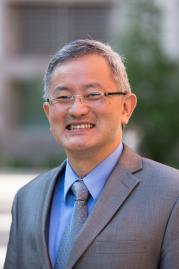
As a physician–scientist, Dr. Okada has been dedicated to brain tumor immunology and development of effective immunotherapy for brain tumor patients for over 20 years. His team was one of very first to discover cytotoxic T lymphocyte (CTL) epitopes in glioma-associated and glioma-specific antigens. Dr. Okada also found critical roles for the integrin receptor very late activation antigen (VLA)-4 and the chemokine CXCL10 in facilitating entry of CTLs to the brain tumor site. Dr. Okada has translated these discoveries into a number of innovative immunotherapy clinical studies in both adult and pediatric brain tumor patients. Dr. Okada’s discoveries have also led to two currently active multicenter trials (NCT02078648 and NCT02960230), each involving 15 or more sites. Most recently, Dr. Okada has developed a novel chimeric antigen receptor (CAR) against epidermal growth factor receptor (EGFR)viii and cloned a high affinity T-cell receptor against H3.3K27M, both of which are glioma-specific antigens. Dr. Okada’s team has also pioneered in discoveries of novel immunoregulatory mechanisms in gliomas, such as one mediated by myeloid-derived suppressor cells (MDSC) and mutations of the isocitrate dehydrogenase (IDH) enzymes IDH1 and IDH2. To improve radiologic evaluation criteria for brain tumor patients undergoing immunotherapy, Dr. Okada leads an international group of brain tumor immunotherapy experts to develop novel iRANO criteria.
Dr. Okada is a Professor of Neurosurgery at University of California, San Francisco, and a member of Parker Institute for Cancer Immunotherapy. Dr. Okada serves as an associate editor for Neuro-Oncology.
